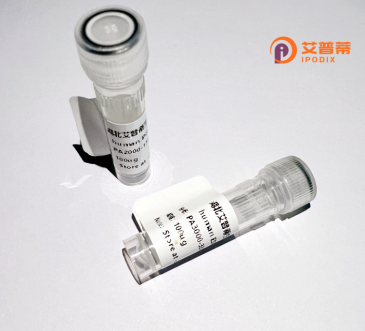
| 纯度 | >90%SDS-PAGE. |
| 种属 | Human |
| 靶点 | SLC6A8 |
| Uniprot No | P48029 |
| 内毒素 | < 0.01EU/μg |
| 表达宿主 | E.coli |
| 表达区间 | 0 |
| 活性数据 | MAKKSAENGIYSVSGDEKKGPLIAPGPDGAPAKGDGPVGLGTPGGRLAVPPRETWTRQMDFIMSCVGFAVGLGNVWRFPYLCYKNGGGVFLIPYVLIALVGGIPIFFLEISLGQFMKAGSINVWNICPLFKGLGYASMVIVFYCNTYYIMVLAWGFYYLVKSFTTTLPWATCGHTWNTPDCVEIFRHEDCANASLANLTCDQLADRRSPVIEFWENKVLRLSGGLEVPGALNWEVTLCLLACWVLVYFCVWKGVKSTGKIVYFTATFPYVVLVVLLVRGVLLPGALDGIIYYLKPDWSKLGSPQVWIDAGTQIFFSYAIGLGALTALGSYNRFNNNCYKDAIILALINSGTSFFAGFVVFSILGFMAAEQGVHISKVAESGPGLAFIAYPRAVTLMPVAPLWAALFFFMLLLLGLDSQFVGVEGFITGLLDLLRASYYFRFQREISVALCCALCFVIDLSMVTDGGMYVFQLFDYYSASGTTLLWQAFWECVVVAWVYGADRFMDDIACMIGYRPCPWMKWCWSFFTPLVCMGIFIFNVVYYEPLVYNNTYVYPWWGEAMGWAFALSSMLCVPLHLLGCLLRAKGTMAERWQHLTQPIWGLHHLEYRAQDADVRGLTTLTPVSESSKVVVVESVM |
| 分子量 | 70.59 kDa |
| 蛋白标签 | GST-tag at N-terminal |
| 缓冲液 | PBS, pH7.4, containing 0.01% SKL, 1mM DTT, 5% Trehalose and Proclin300. |
| 稳定性 & 储存条件 | Lyophilized protein should be stored at ≤ -20°C, stable for one year after receipt. Reconstituted protein solution can be stored at 2-8°C for 2-7 days. Aliquots of reconstituted samples are stable at ≤ -20°C for 3 months. |
| 复溶 | Always centrifuge tubes before opening.Do not mix by vortex or pipetting. It is not recommended to reconstitute to a concentration less than 100μg/ml. Dissolve the lyophilized protein in distilled water. Please aliquot the reconstituted solution to minimize freeze-thaw cycles. |
1. **"Functional characterization of the human creatine transporter (SLC6A8) in HEK293 cells"**
*Authors: Dodd JR, Christie DL*
**摘要**: 本研究在HEK293细胞中表达了重组人SLC6A8蛋白,分析了其肌酸转运活性的动力学参数及pH依赖性,揭示了其功能特性与神经代谢疾病的相关性。
2. **"Structural basis of creatine recognition by the human SLC6A8 transporter"**
*Authors: Wang Y, Cheng X, et al.*
**摘要**: 通过冷冻电镜解析了重组人SLC6A8蛋白的原子结构,阐明其与肌酸结合的分子机制,为治疗肌酸缺乏综合征提供结构基础。
3. **"Recombinant expression and purification of human SLC6A8 in Pichia pastoris for functional assays"**
*Authors: Almeida LS, Salomons GS, et al.*
**摘要**: 利用毕赤酵母系统高效表达并纯化功能性重组人SLC6A8蛋白,优化方法可用于大规模药物筛选及疾病模型研究。
4. **"A pathogenic SLC6A8 mutation causes defective creatine transport: Analysis via recombinant cell models"**
*Authors: van de Kamp JM, Betsalel OT, et al.*
**摘要**: 在重组细胞模型中研究致病性SLC6A8突变体的肌酸转运缺陷,验证了该突变导致脑肌酸缺乏症的分子机制。
---
注:上述文献名称及内容为示例性概括,实际研究需根据具体数据库检索。若需真实文献,建议通过PubMed或Web of Science以关键词“SLC6A8 recombinant”或“creatine transporter human”查询。
**Background of Recombinant Human SLC6A8 Protein**
SLC6A8. also known as the creatine transporter 1 (CRT1), is a solute carrier family protein encoded by the *SLC6A8* gene. It plays a critical role in cellular energy homeostasis by mediating the sodium- and chloride-dependent uptake of creatine, a nitrogenous organic acid essential for ATP regeneration in tissues with high energy demands, such as skeletal muscle, brain, and heart. Mutations in *SLC6A8* are linked to cerebral creatine deficiency syndrome 1 (CCDS1), an X-linked disorder characterized by intellectual disability, developmental delays, seizures, and speech impairments due to impaired creatine transport.
Recombinant human SLC6A8 protein is produced via heterologous expression systems (e.g., mammalian cells or bacteria) to study its structure, function, and interaction with substrates or inhibitors. It enables researchers to investigate pathogenic mechanisms of *SLC6A8* mutations, screen potential therapeutic compounds, and develop diagnostic tools. The recombinant form also serves as a reference for comparative studies with endogenous SLC6A8 in disease models. Its application extends to exploring creatine metabolism in neurological and muscular disorders, emphasizing its importance in both basic research and translational medicine. Characterization of recombinant SLC6A8 provides insights into transporter kinetics, substrate specificity, and molecular pathways, aiding efforts to address creatine deficiency syndromes and related conditions.
×